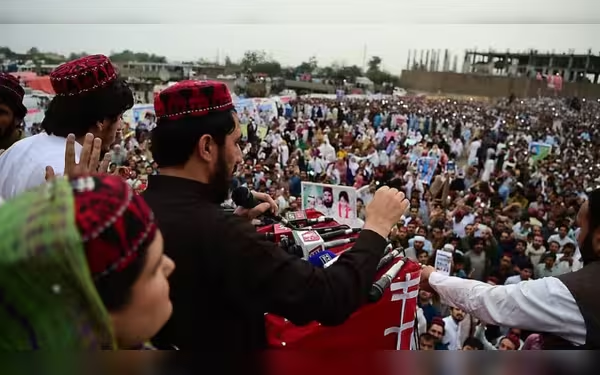Saturday, November 16, 2024 07:24 PM
Government Bans Pashtun Tahafuz Movement Over Security Concerns
- Government cites security threats from PTM activities.
- Ali Wazir faces legal challenges amid ongoing tensions.
- Critics argue ban undermines free speech in Pakistan.
 Image Credits: en.dailypakistan.com.pk
Image Credits: en.dailypakistan.com.pkThe government has imposed a ban on the Pashtun Tahafuz Movement, citing security threats and raising concerns over free speech in Pakistan.
In a significant move, the Shehbaz Sharif-led coalition government has announced a ban on the Pashtun Tahafuz Movement (PTM), a group that has been vocal about the rights of the Pashtun community in Pakistan. The decision comes amid rising concerns regarding national peace and security, with officials citing potential threats posed by the movement's activities. The PTM, which is led by Manzoor Pashteen, has been at the forefront of advocating for the rights of Pashtuns, particularly in the context of military operations and alleged human rights abuses in the region.
The PTM has gained considerable attention over the years, rallying support from various segments of society. However, the government’s recent actions reflect a growing unease about the movement's influence and its ability to mobilize large crowds. Ali Wazir, a prominent figure within the PTM and a former Member of the National Assembly (MNA) from South Waziristan, has faced multiple legal challenges, including accusations related to terrorism and hate speech. His prolonged detention has raised questions about the government's approach to dissent and the treatment of political activists.
Critics of the ban argue that it stifles free speech and undermines the democratic process in Pakistan. They contend that the PTM's demands for justice and accountability should be addressed through dialogue rather than suppression. Supporters of the government, on the other hand, believe that the ban is a necessary step to maintain order and prevent any potential unrest that could arise from the PTM's activities.
This situation highlights a broader issue in Pakistan regarding the balance between national security and the rights of citizens to express their grievances. As the government navigates these complex dynamics, it is crucial for all stakeholders to engage in constructive dialogue. The future of the PTM and its impact on the Pashtun community remains uncertain, but it is clear that the conversation around rights, representation, and security will continue to evolve.
The ban on the Pashtun Tahafuz Movement raises important questions about governance, civil liberties, and the role of political movements in Pakistan. As the nation grapples with these challenges, it is essential for citizens to remain informed and engaged in discussions that shape their rights and freedoms. The path forward will require a careful balance between ensuring security and upholding the democratic values that are foundational to the country.













